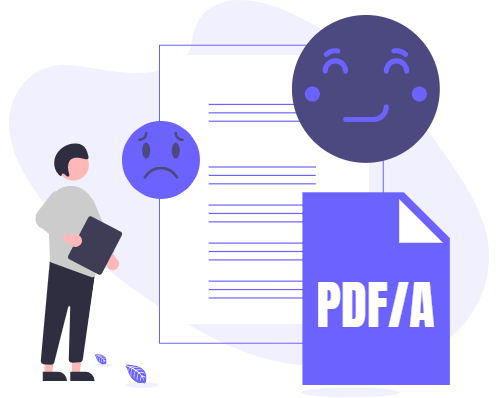The pros and cons of using PDF/A

Utilizing PDF has a number of benefits, but are you familiar with the alternative format “PDF/A”? If not, let’s check it out right away!
What is PDF/A?
The Portable Document Format Archival, sometimes known as PDF/A, is a format created specifically for document preservation in digital records. However, the format can also be applied to scanned documents. It is a part of the PDF format and a world standard. The fact that PDF formats are open standards, widely adopted worldwide, and created to store both images and machine-readable text in a single document is one of its many benefits. To understand more, please click here.
Pros
- Sustainable
Since the advent of the PDF format in 1991, its demise appears improbable in the near future. Again, PDF/As will be simple to read and utilize as long as PDF exists. - Supports authenticity
Understanding how crucial it is to make sure that digital records maintain their authenticity, aren’t changed after being created, and don’t end up containing information that is different from what they initially did. Although no file format alone can guarantee 100% authenticity, PDF/A helps authenticity by making modifications challenging and by offering document protection.
- Facilitating metadata
Good metadata is frequently required to provide context for digital material in order to interpret it. Numerous bits of information, such as the author’s name and the file’s creation date. It is crucial to be able to save this metadata when converting one digital file to another because metadata for digital files is frequently kept within the file itself. Rich metadata is specifically supported by PDF/A.
- No Restrictions over platforms
The PDF format has been available on all major computing platforms since its creation, and the PDF/A format shares this benefit. This implies that a PDF/A produced in a Windows environment will be fully readable and functional in a Mac environment, and vice versa.
Cons
- Larger file size
Certain digital documents or records should not be converted to PDF/A. One could, for instance, save a webpage as a PDF/A, but the resulting file would be large and challenging to use. Since any typefaces used in the file must be embedded, PDF/As can grow larger than standard PDFs. - Forbidden conversion
The conversion of some digital files to PDF/A is possible. This can occur when the files contain features that are not allowed in PDF/A because there is no known way to keep them intact over time. Documents featuring audio and video data as well as Javascript are examples of such files.
How to turn a PDF into a PDF/A?
There are various PDF to PDF/A converters available on the market but you would want to use just “any kind” of converter as it is also a matter of your cyber security. Hence, we suggest using the VP Online Free PDF Converter, it is an excellent convert that allows you to convert your PDF into various formats including PDF/A and it enables quick conversion. On VP Online Editor, you may quickly and conveniently convert PDF to PDF/A.
This post is also available in Deutsche, Español, فارسی, Français, English, Bahasa Indonesia, 日本語, Polski, Portuguese, Ру́сский, Việt Nam, 简体中文 and 繁體中文.

















